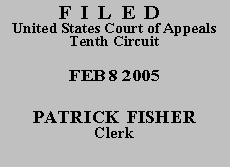

| RAYMOND TAYLOR,
Plaintiff-Appellant, v. JOSEPH CORRAL, Unit Manager, Torrance County Detention Facility; ALFRED JARAMILLO, Disciplinary Hearing Officer, Torrance County Detention Facility, Defendants-Appellees. |
No. 04-2016 (D.C. No. CIV-01-368 BB/RHS) (D. N.M.) |
ORDER AND JUDGMENT(*)
Raymond Taylor, proceeding pro se, appeals the district court's dismissal of his civil rights action. Because he failed to comply with 28 U.S.C. § 636(b)(1) and did not file objections to the magistrate judge's proposed findings and recommended disposition, he waived his right to appeal the district court's order. Accordingly, we dismiss this appeal.(1)
Previously, the federal district court dismissed for failure to state a claim Mr. Taylor's civil rights action alleging various constitutional violations, including the denial of due process when he was kept in segregation beyond his scheduled release date. On appeal, this court affirmed in part, but reversed the dismissal of the due process claim and remanded it for further proceedings. Taylor v. Stewart, 49 Fed. Appx. 262 (10th Cir. 2002). After further proceedings on remand, the magistrate judge recommended that defendants' motion for summary judgment be granted and the case be dismissed with prejudice.
In his proposed findings and recommendation, the magistrate judge specifically stated that pursuant to § 636(b)(1), the parties had ten days after service of the proposed findings and recommendations to file written objections with the district court, and failure to do so would bar their ability to seek appellate review of the proposed findings and recommendations. Neither party filed objections. Noting the failure to object, the district court adopted the magistrate judge's proposed findings and recommended disposition and dismissed the case with prejudice. We issued a show cause order directing the parties to address whether Mr. Taylor's failure to file written objections to the magistrate judge's proposed findings and recommended disposition waived appellate review.
"We have a firm waiver rule when a party fails to object to the findings and recommendation of the magistrate [judge]." Hill v. SmithKline Beecham Corp., 393 F.3d 1111, 1114 (10th Cir. 2004) (quotation omitted). If a party fails to timely object, he waives appellate review of any factual or legal issues. Id. We do make exceptions to this rule, however, "where the interests of justice so require," Fottler v. United States, 73 F.3d 1064, 1065 (10th Cir. 1996), or "when the magistrate's order does not clearly apprise the pro se litigant of the consequences of a failure to object," Talley v. Hesse, 91 F.3d 1411, 1413 (10th Cir. 1996).
Contrary to our show cause order, Mr. Taylor did not discuss in his appellate brief his failure to object to the magistrate judge's proposed findings and recommended disposition. Nothing in the record convinces us that either exception to the firm waiver rule applies here. First, the magistrate judge clearly stated that Mr. Taylor was required to file objections within ten days, and that failure to do so would bar appellate review. R., Doc. 50 at 11-12. Second, neither Mr. Taylor's arguments on appeal nor anything in the record convinces us that application of the firm waiver rule would be contrary to the interests of justice.
Accordingly, we DISMISS this appeal. We GRANT Mr. Taylor's motion to proceed on appeal without prepayment of the appellate filing fee. We remind him of his obligation to continue making partial payments until the entire fee has been paid. The mandate shall issue forthwith.
Entered for the Court
Circuit Judge
*. This order and judgment is not binding precedent, except under the doctrines of law of the case, res judicata, and collateral estoppel. The court generally disfavors the citation of orders and judgments; nevertheless, an order and judgment may be cited under the terms and conditions of 10th Cir. R. 36.3.
1. Defendants argue this court lacks jurisdiction to consider this appeal. The magistrate judge filed his proposed findings and recommended disposition on December 31, 2003, and the district court entered its final order on February 2, 2004. Also on February 2, Mr. Taylor filed a notice of appeal, indicating he was appealing from the magistrate judge's decision. This notice of appeal was premature and failed to identify the district court's final order. See Colo. Bldg. & Constr. Trades Council v. B.B. Andersen Constr. Co., 879 F.2d 809, 809, 811 (10th Cir. 1989) (holding magistrate judge cannot enter final, appealable order without parties' express consent and designation by district court).
The district court, however, failed to enter a separate judgment. See Fed. R. Civ. P. 58. Thus, Mr. Taylor's time for filing a notice of appeal began to run 150 days from the entry of the district court's order on February 2. See Fed. R. Civ. P. 58(b)(2)(B). And, under Fed. R. App. P. 4(a)(1)(A), he had an additional thirty days to file the notice of appeal. Mr. Taylor's appellate brief, filed April 19, 2004, before expiration of the notice of appeal filing deadline, qualifies as the notice of appeal required by Fed. R. App. P. 3. See Smith v. Barry, 502 U.S. 244, 245 (1992). Accordingly, we conclude we have jurisdiction to consider this appeal.